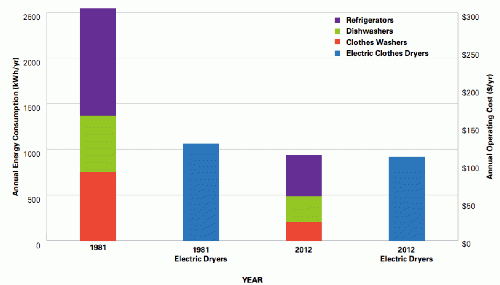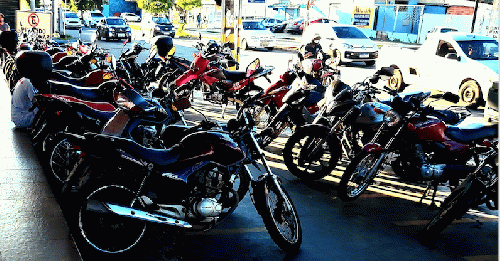Of course, the two wheel options use a lot less energy than cars, especially the electric bikes and scooters. I think this is for people under 50, but a change in the attitude and values associated with two wheeled transportation could make a huge difference in usage. That attitude would be a big part of a shift, just as is the case for shifting from central to room air conditioning. DOE delves extensively into behavior change as related to energy.
Then there's hot water.
Most domiciles in the USA use hot water heated tanks that hold 50-80 or more gallons, kept heated all the time. Every faucet has hot and cold running water. You don't see that here. Bathroom and kitchen sinks only have cold water. Washers heat the water themselves. Showers have small electric heaters that instantly heat the water. I think that Brazilians would think it would be crazy to use a hot water tank, or something only the very rich would use. I haven't seen a single bathtub in my travels. They all use showers. If you think about it, early Americans didn't have showers, they had tubs, filled manually. Perhaps that's why we see tubs as such a natural part of a home. Switching to electrical heating might cost more per gallon used but there would be no wasted heating of water that sits in big tanks, unused. Brazilians are sensitive to energy bills. Using instant hot water showers and washing machines costs less.
I was talking with OEN Zoom meeting friend Bob Stuart and he commented,
"In the beginning, there were fires and kettles. Then came Peter's wood stove with a built in water heater, but it needed a tank to build up enough hot water for a bath or a washtub. People were used to using tanks when electric heaters came in, and the wires were pretty feeble, so it still took a long time to build up enough hot water for the next shower.
The "tankless" or "on-demand" water heater needs a powerful energy supply to substantially warm more than a trickle. This is easier to arrange without large extra expenses now. Peter's heater probably has a pipe section stuffed with the same sort of elements you see on a stove top or inside a water tank. In Brazil, I think they just run the electricity right through the water, and trust the hardware to keep you safe. Those units are smaller and cheaper.
The US can afford waste, so of course it is advertised as what we really need. We are always sold the most expensive, rent-producing solution to perceived need that we will buy. "
Drying Clothes
Most of the homes I've been to, even the upscale ones, in Brazil don't use clothes dryers. They use clothes drying setups that allow you to hang a lot of clothes, linens and towels to dry in a small space.
In an article, Your clothes dryer is a huge energy waster, Grist magazine reports,
"Buy a new major appliance today and it'll be a lot more energy efficient than what was on the market 20 or 30 years ago. Unless, that is, you're buying a dryer.
The Natural Resources Defense Council on Thursday put out an issue brief and call to action regarding money- and energy-wasting clothes dryers. While manufacturers have boosted the efficiency of washing machines, refrigerators, and other appliances in recent decades, their enthusiasm for doing the same thing for dryers has been damp at best. Dryers remain so energy hungry that even a new one can consume as much electricity as an efficient new clothes washer, refrigerator, and dishwasher combined."
The offer a chart from the Natural Resources Defense Council.

Annual energy consumption of electric clothes dryers vs. other major home appliances, 1981 and 2012
(Image by Natural Resources Defense Council) Details DMCA
So... I'm going to start drying some of my clothes, towels and linens, using clothes line strung up in the basement hallway where my washer and dryer are. I'll still use the dryer for some clothes, but I think I can cut use in half. I'm getting used to it putting clothes up to dry while in Brazil. The gadget in the AirBNB apartment we're renting is about a meter by 25 centimeters, with 6 spaced rods to hold a washer full of clothes, towels and linens.
(Note: You can view every article as one long page if you sign up as an Advocate Member, or higher).







